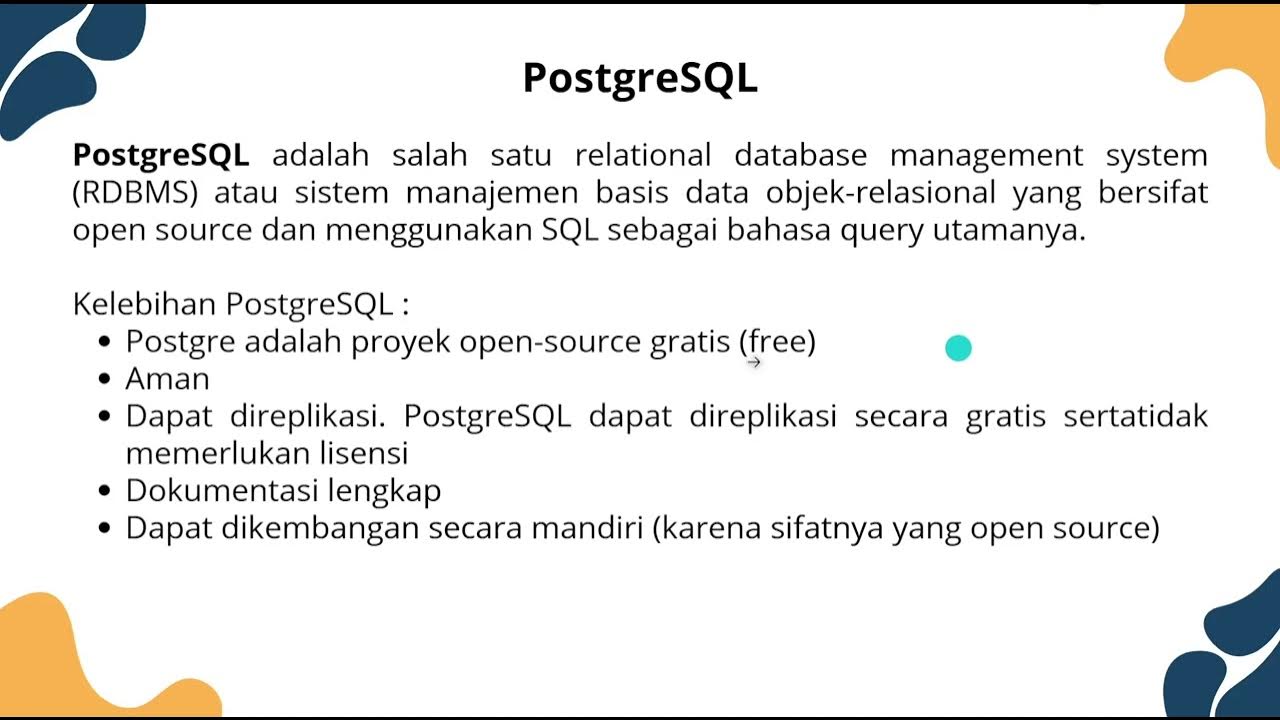SBD1 Pertemuan1 | 3IA03 & 3IA04
Summary
TLDRIn this informative session, Nur introduces the fundamentals of database systems, covering both SQL and NoSQL databases, and the significance of data organization. Key concepts such as entities, records, attributes, and the differences between various database models are explained. The lecture highlights PostgreSQL as a prominent open-source relational database management system, detailing its advantages and data types. Additionally, Nur outlines the distinctions between object-based and record-based databases, along with the hierarchical and network models, ensuring students grasp essential database concepts for their practical work.
Takeaways
- 😀 Introduction to database systems and their importance in organizing data.
- 📊 Definition of a database as an organized collection of interrelated data.
- 📂 Explanation of entities and their attributes, including examples from student administration.
- 📁 Description of files as collections of similar records with identical attributes.
- 📝 Overview of SQL and NoSQL databases, highlighting their differences.
- 💾 Introduction to PostgreSQL as an open-source relational database management system.
- 🔍 Importance of database models, including hierarchical and network models, for data representation.
- 🏷️ Discussion of the advantages of PostgreSQL, such as security, documentation, and replicability.
- 🔗 Explanation of object-based vs. record-based database systems and their characteristics.
- ⚙️ Mention of data types in PostgreSQL, including numeric, temporal, and special types.
Q & A
What is a database?
-A database is a collection of organized and interconnected data that can be easily accessed, typically managed by a database management system.
What is the maximum allowable absence for students in this practicum?
-Students can be absent a maximum of two times, provided they inform the hotline for permission to attend future sessions.
What are the two main types of databases discussed in the script?
-The two main types are SQL (Structured Query Language) databases and NoSQL (Not Only SQL) databases.
What is SQL and what is its primary use?
-SQL stands for Structured Query Language, and it is used to manage and manipulate relational databases.
Can you explain the concept of an entity in a database?
-An entity represents a person, place, event, or concept, and contains related information, typically structured as records.
What is the difference between a record and an attribute?
-A record is a collection of related fields (data points) about a specific entity, while an attribute is a specific piece of information that describes an entity.
What are the advantages of using PostgreSQL as a database management system?
-PostgreSQL is an open-source, relational database management system that is secure, replicable, and offers comprehensive documentation, making it versatile for various applications.
How does a NoSQL database differ from an SQL database?
-NoSQL databases do not require a fixed schema and can store unstructured data, while SQL databases use a structured format with predefined schemas.
What are some examples of SQL databases mentioned in the script?
-Examples include Oracle, Microsoft SQL Server, and PostgreSQL.
What is the role of data models in database management?
-Data models help represent and organize data relationships and constraints, making it easier for users to understand and work with complex datasets.
Outlines

Cette section est réservée aux utilisateurs payants. Améliorez votre compte pour accéder à cette section.
Améliorer maintenantMindmap

Cette section est réservée aux utilisateurs payants. Améliorez votre compte pour accéder à cette section.
Améliorer maintenantKeywords

Cette section est réservée aux utilisateurs payants. Améliorez votre compte pour accéder à cette section.
Améliorer maintenantHighlights

Cette section est réservée aux utilisateurs payants. Améliorez votre compte pour accéder à cette section.
Améliorer maintenantTranscripts

Cette section est réservée aux utilisateurs payants. Améliorez votre compte pour accéder à cette section.
Améliorer maintenant5.0 / 5 (0 votes)






